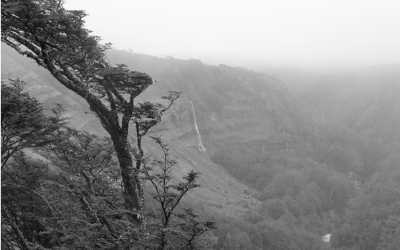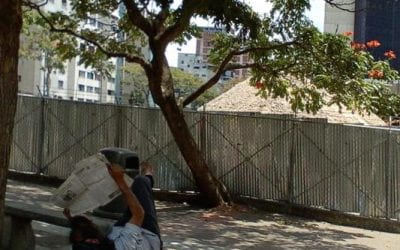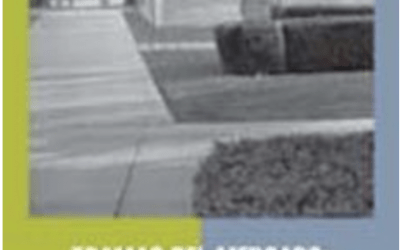Forum Venezuela
Moving Students, Student Movements

A young man wearing the colors of the Venezuelan flag has “No” written on his hands in opposition to the proposed constitutional reforms. Photo by Lindsay Ross.
Harvard’s Forum Venezuela, a student-run organization, seeks to promote awareness of Venezuelan issues and culture, while connecting Venezuelan students living inside the United States both to each other and with their countrymen and women back home.
The Forum was founded in the mid-1990s by Kennedy School of Government students who wanted to reach out beyond the confines of the school and to the sizeable but disconnected Venezuelan community in the United States. The Forum had grown outside Harvard’s gates and expanded to New York City and Washington D.C., managed by Venezuelan students from other local universities.
For more than a decade, the Forum has hosted dozens of talks, presentations, discussions and other cultural events about Venezuela. It has become a space that helps build relationships nd common projects and plans promote the development of Venezuela.
The 2007-2008 School Year
Throughout the 2007-2008 school year, Forum Venezuela hosted multiple discussion groups and presentations for Venezuelans in Boston, as well as movie nights for the general community. Topics ranged from Music in Venezuela to Illicit Economies and Private Property Laws.
Then in late 2007, a proposed constitutional reform (which would have done away with term limits in Venezuela) was voted down largely because of a university student movement that seemingly came out of nowhere to become a political force in the country. Forum Venezuela took a great interest in these developments and successfully nominated the student leader of that national movement, Yon Goicoechea, as one of the “Rising Stars” of the Kennedy School Review.
Once connected with student counterparts back home, Forum Venezuela put together a series of events that brought Goicoechea, as well as student leaders Geraldine Alvarez and Douglas Barrios, to Harvard in May 2008 for a three day series of events, including talks at Harvard’s Kennedy and Education Schools and a well-attended large public presentation for the greater Boston community.
The Year To Come…
This incoming academic year also promises to be an exciting one for Forum Venezuela. FV’s mailing list has already connected hundreds of Venezuelans from the “diaspora” through an email server and a Facebook group offering updates on upcoming events as well as a platform for discussion. Of course, Forum Venezuela will continue to host movie nights and cultural events for the Harvard community. Furthermore, talks are currently taking place with prominent individuals from sectors as varied as the music world, the military and the Venezuelan Consulate in the hopes of bringing more Venezuelan speakers to Harvard. The belief is that such events not only raise awareness of the country but foster an atmosphere in which different views can be debated and the richness of Venezuelan life can be showcased.
An unfortunate byproduct of the political tensions embroiling the country at present is that conversations on Venezuela (both among Venezuelans themselves and the outside world) are often focused merely on attacking or defending President Hugo Chávez and his policies. One of the great challenges facing Forum Venezuela in the future will be to continue presenting the nation’s politics, while at the same time exposing Harvard students and others to the vibrant culture, natural beauty and rich history that also define Venezuela.
The organizers of Forum Venezuela hope that as the organization continues to grow it will connect Venezuelans not only in Boston but throughout the United States and beyond. Forum Venezuela will offer incoming students and professionals a ready made network of friends and acquaintances, while helping them stay informed and involved with what is going on back home. Finally, it is our hope to raise awareness of Venezuela throughout the international community.
Wikipais: The Academic Blog For Policy-Making
The biggest project that Forum Venezuela will work on during next year is the launch of Wikipaís, a web-based academic blog for Venezuelan policy-making. This blog intends to serve as the tool that the most experienced analysts and policy-makers will use to design, develop and promote the public policies needed in order to let Venezuela work its way out of poverty, inequality and economic instability.
The blog has two main rules: authors will focus on the future rather than the past, and authors will not use this tool to promote their individual political agendas. Blog readers will vote on their favorite policies and provide feedback to the authors. Authors will amend their policies based on the comments provided. The final proposals with the most number of votes will be promoted and implemented by the Fundación Futuro Presente, an NGO created by Yon Goicoechea and other members of the Venezuelan Student Movement to promote the social and economic development of our country.
The main benefit of this blog is that it helps to formulate common (rather than individual) knowledge to create efficient policies. Similar to the way the Wikipedia works, this blog intends to build on the arguments and proposals exposed by others.
In Venezuela, as in many other countries, the political debate is mainly centered in the past: analysts boost themselves by criticizing governments and NGOs, blaming their policies for continued social and economic unrest. After 10 years of the Bolivarian Revolution of President Hugo Chávez, the Venezuelan nation still faces several basic problems such as the inefficient public healthcare system and growing insecurity in citizens’ lives. Chávez’s opponents argue that his mandate has not been able to amend any of these problems, but they in turn have failed to provide viable solutions.
Hence, the main intent of this blog is to create an atmosphere that focuses on the future. Comments and proposals that do not abide by this rule will be sent back to their authors for revision. This way, we will guarantee that the blog does not become a space for meaningless political debate but rather a place that helps create the most efficient policies.
We are excited about this initiative and invite you to help us make this project a reality. Maybe some day our site will grow to help other countries benefit from this idea as well.
Related Articles
Editor’s Letter: Venezuela
Long, long ago before I ever saw the skyscrapers of Caracas, long before I ever fished for cachama in Barinas with Pedro and Aída, long before I ever dreamed of ReVista, let alone an issue on Venezuela, I heard a song.
Elections and Political Power: Challenges for the Opposition
English + Español
Next month’s elections will be an important benchmark in Venezuelan politics. On November 23, voters will go to the polls to elect 22 state governors and 355 mayors in as many municipalities, as well as choose the mayor of Caracas. The elections are taking place in a political environment influenced by the abrupt proclamation of 26 laws on July 31, the last day of President Chávez’s 18-month powers to issue emergency decrees …
A Review of Tramas del mercado: imaginación económica, cultura pública y literatura en el Chile de fines del siglo veinte
Luis Cárcamo-Huechante’s new book provides us with a convincing counter-narrative, at once nuanced and succinct, to three mainstream narratives of the neoliberal free market in Chile: those of monetarist economics, promotional politics, and literary bestsellers. It covers the Pinochet dictatorship (1973-90) and the transition to democracy from its official inauguration in 1988, with the victory of the Yes vote for a return in two years’…




